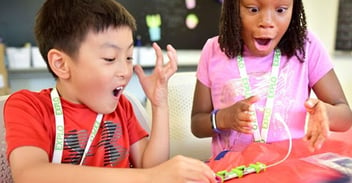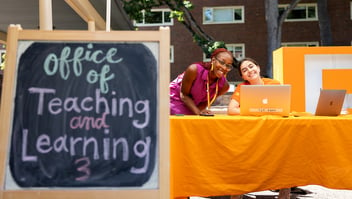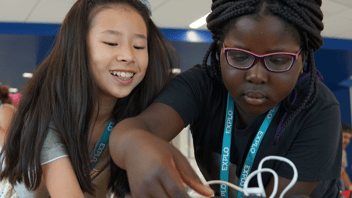4 Teaching Strategies That Academic Summer Programs Use
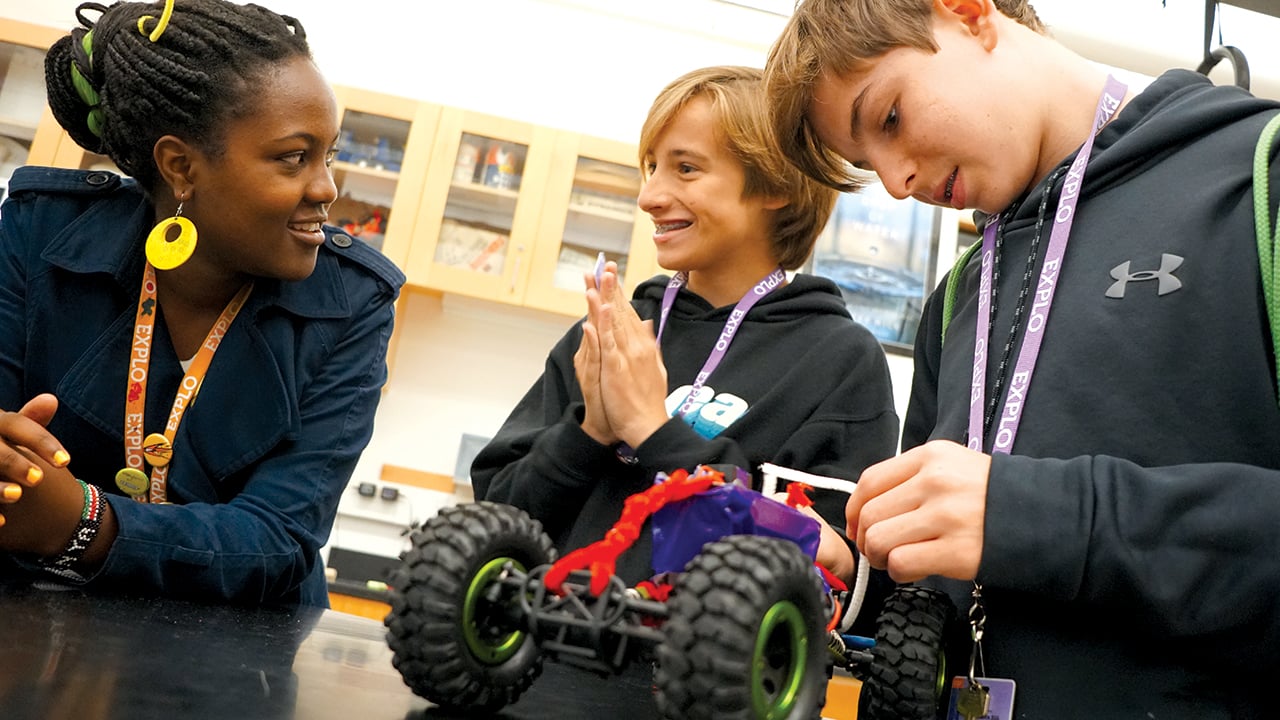
The leaders of the country’s best academic summer programs aren’t just camp counselors and administrators; they’re committed educators. They know you’ve put your trust in them to guide your child along a journey of exploration and discovery, sparking new interests, creativity, and a love of learning that will endure well beyond the few weeks your child spends at camp.
And like all good educators, leaders and faculty of high-quality academic summer camps stay on top of the latest educational research and practices.
To find out more about the cutting-edge teaching strategies the team at your child’s summer program might employ, we spoke with EXPLO’s Executive Director and President, Moira Kelly. EXPLO is a pioneer in summer educational programming, stemming from its founding in the halls of MIT almost 50 years ago.
Read on to find out more.
Strategy 1: Active Learning
How is an active learning approach different from the teaching style most children experience in their middle and high schools?
Moira: There are many college- and university-based educational summer programs where the primary mode of instruction is lecturing. But what we know about lectures is that they’re ineffective. All the research points to the fact that it’s a very passive way of learning. It also happens to be a popular way that many universities, high schools, and even middle schools convey information.
“When the application is tied to the real world students can actually see, experience, and understand how seemingly abstract concepts and theories really do play out all around them.”
Active learning, on the other hand, is hands-on. It asks you to take concepts and apply them — to use them. When someone can put a concept or theory to use, they connect what they’re learning to the world around them. When the application is tied to the real world, students can actually see, experience, and understand how seemingly abstract concepts and theories really do play out all around them every day. Your understanding of the world becomes deeper and richer. You look at things differently.
Unfortunately, too often students are merely learning something to get through the next test. When that happens they don't remember what they’ve learned for very long. It really does become, “In one ear and out the other.”
We call active learning “active” because students are active participants in their own learning.
What are some of the ways campers at a program like EXPLO experience active learning?
Moira: Every course at EXPLO is centered on active learning. Students are always getting their hands on things, solving real-world problems, and putting their knowledge to work.
For example, at EXPLO Pre-College + Career, students in our Surgical Interventions + Biomedical Engineering Concentration get to work with real specimens, perform animal dissections, and build and test their own surgical devices. They learn how to hold a scalpel correctly and work with digital simulations. That’s a long way from trying to memorize the different parts of human anatomy out of a textbook.
Our younger students at the Junior Program get to learn about chemistry and biology using seed crystals — they get to grow their own potassium alum crystals to explore supersaturation and crystallization. They learn about DNA and extract strawberry DNA. They talk about animal and plant cells, and then get to look at them under a microscope.
We’ve also made it a priority to partner with top organizations and experts in our areas to give our students “real-world” experiences. Whether they’re dusting for fingerprints with Dr. Henry Lee or preparing for trial with Hon. Richard L. Gabriel, our students are applying their knowledge in circumstances that feel very, very real.
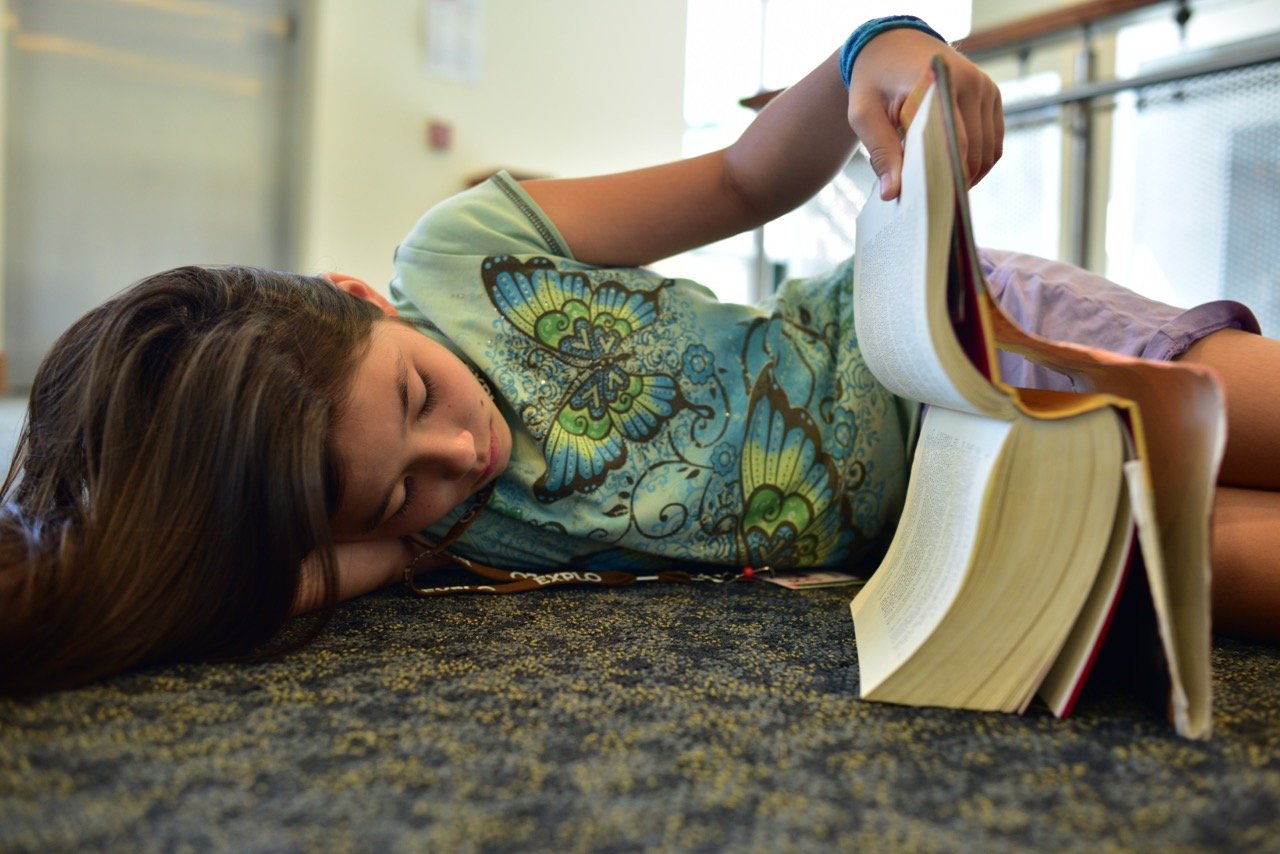
Strategy 2: Helping Introverted Students Feel Valued
We hear a lot lately about the difference between introverted and extroverted people. Businesses and other organizations are really beginning to recognize the value of the introverted mindset. How can a summer program like EXPLO serve the unique learning styles of introverts?
Moira: In many schools and workplaces, we’ve developed practices that put a premium on being an extrovert. In doing so, we’ve set up cultures where a good 40% of the population is left to the fringes and is unsupported. A good learning environment is one where introverts can feel appreciated and supported. For example, making sure that we don’t set up courses where the only way students can show they are participating is speaking in class a lot — or raising their hands a lot.
I recall a visitor to EXPLO walking around the quad with me and noticing in the tumult of the play — balls and frisbees flying around, kids playing tag, and groups socializing — that dotting the landscape were a few kids quietly reading. This person asked why we weren’t gathering those kids up to make them play with other kids. This person assumed the readers were reading because they didn’t have friends, and that we should do something about it. That’s not what was going on at all. I knew these kids. They had friends. They just needed a bit of time to decompress with some quiet time. They were not suffering from some pathology.
Part of what you do to support introverted kids is: make sure that your faculty and staff really take a look at their own biases. In their heart of hearts do they think extroverts are better? Why? How does that play out in classes, on the playing fields, in the bunkhouse, in a dorm? We have to help extroverted kids understand introverted students. How do they approach the world differently? How do we help introverted students understand their own strengths and how to talk with others about their needs?
This all comes down to cultivating a culture of kindness and an appreciation that we are all different from one another. When the foundation of the culture is firmly rooted in kindness, it changes the dynamics of the entire environment.
Any good examples of that?
Several years ago, we had a quiet-ish 10-year-old student who signed up to be in the talent show. Typically, kids in the talent show do things like playing instruments, dancing, or even silly things like making noises under their armpits. When this kid got up on stage he announced to the crowd, “For my talent, I’m going to solve an algebra problem.”
What a good camp can do — for extroverted and introverted children — is help them find their courage, and cultivate their courage to do things that are outside of their comfort zones.
So he’s standing there with this big black marker doing an algebra problem on this big pad of paper. He gets through almost a dozen steps and then realizes he made an error. He crosses everything out. He turns to the audience, and with a frown on his face he says, “I made a mistake and I have to start over.” No one said a word or made a sound. You could have heard a pin drop. He went back to solving the problem and it felt like he was up there for a very long time. The tension was palpable. Would he solve it or not?
Finally, he solved it. At that moment, he turned around with a huge smile on his face. He took a deep bow and announced to the audience that he was done.
The crowd erupted with applause. He got a standing ovation! Everyone was so taken with the courage he showed. Where else do you get a standing ovation for solving a math problem? This kid will remember this forever. It’s years later, and it still leaves an impression on me (and I suspect many others). What a good camp can do — for extroverted and introverted children — is help them find their courage, and cultivate their courage to do things that are outside of their comfort zones.
Strategy 3: Interdisciplinary Learning
How important is interdisciplinary learning at a high-quality academic summer camp?
Moira: It’s hugely important. The most significant problems we have in the world will not be solved by any single discipline. They will be solved because we exercise interdisciplinary or transdisciplinary thinking about them. The people who are making the most significant contributions in their fields, the people who are starting successful companies, the people who are solving some of the world's biggest problems, think in a transdisciplinary fashion.
So, for example, we may start looking at what at first appears to be a medical issue, but then we have to start asking, “But how do economics, sociology, and housing policy impact any possible set of solutions?” To a great degree, a lot of academic subject areas are constructs.
What do you mean by that?
Moira: A number of years ago, someone said, “This is what constitutes biology.” Now we’ve got synthetic biology, we’ve got biochemistry, and we’ve got bioengineering. These things are crashing against one another. Does bioengineering live in the biology department or the engineering department?
That’s a fascinating way of looking at things. How does the interdisciplinary view play out at an educational summer camp?
Moira: Staying with my biology example…one summer at Wellesley, we offered a course on bacterial epidemiology, in which students had to stop a simulated epidemic from spreading worldwide. Of course, to do so, you have to understand how bacteria function and spread, but you also have to understand concepts outside what is customarily considered biology: human behavior, communication strategies, managing a team, and so on.
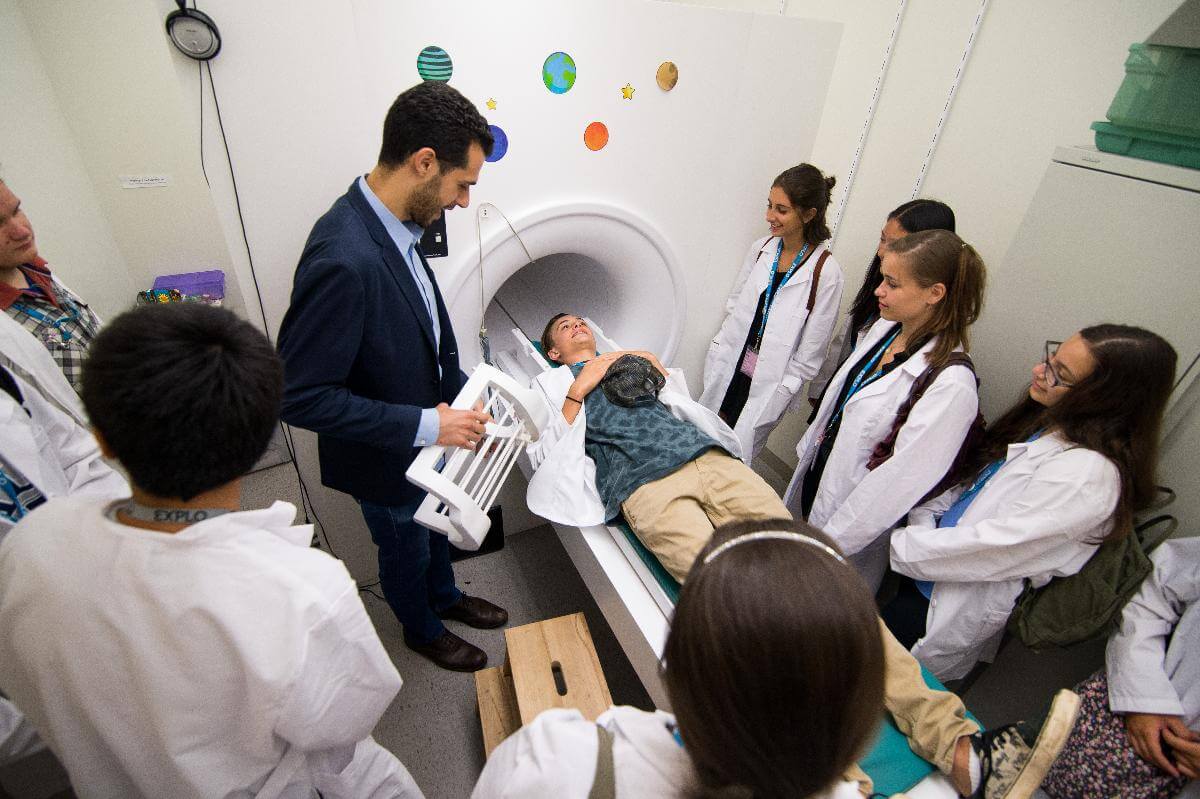
Strategy 4: Conceits and Simulations
What are some of the other teaching strategies an educational summer camp like EXPLO might use?
Moira: One strategy we like to use is conceit attainment. For instance, you might be taking a business management class, and the conceit might be that you’re told, “You’ve just joined a business consulting firm, and we’ve got a client coming in with a certain problem that we’ve got to solve for them.” And so, you live with that conceit throughout the course.
It may be, for another example, that you’re taking a language and culture class, and the first day the instructor says to you, “Hello, ladies and gentlemen. I am glad that you're with us here at the State Department, and in three weeks, you're going to be posted to Malaysia. I'm also well aware that you all don't know much about the culture there, so we've got three weeks to get you ready." And then you go from there.
We also do complex simulations. We might be tackling a North Korean nuclear situation, and we’re in the White House Situation Room, or we’re in the UN. We’ve actually woken kids up at 3 AM to say, “You need to come down. Some new reports have come in from the State Department.” Because it’s in real-time, you’re not going to wait until the next morning when you’ve got a crisis brewing.
Sounds intense!
Moira: It is. It’s intense, and it can be a lot of fun for the students. And going back to active learning, it’s memorable. An experience like that can really stick with them. Of course, these kinds of courses take an incredible amount of planning and preparation. Frankly, a level of preparation that most teachers never have time to do during the academic year. But we’ve found this approach to teaching so impactful that we put a lot of resources into course design.
Last question. We’ve talked about some of the cutting-edge educational strategies used by the best educational summer camps. But there are thousands of summer camps in the nation. How can parents find the ones that are committed to the powerful teaching strategies we talked about today?
We’ve compiled three questions to ask when you’re comparing academic summer programs. As you go through them, your list of options will shrink from thousands to a manageable number.
If you have any lingering questions, feel free to schedule a call with an Admission Counselor — or sign up for a free Info Meeting!

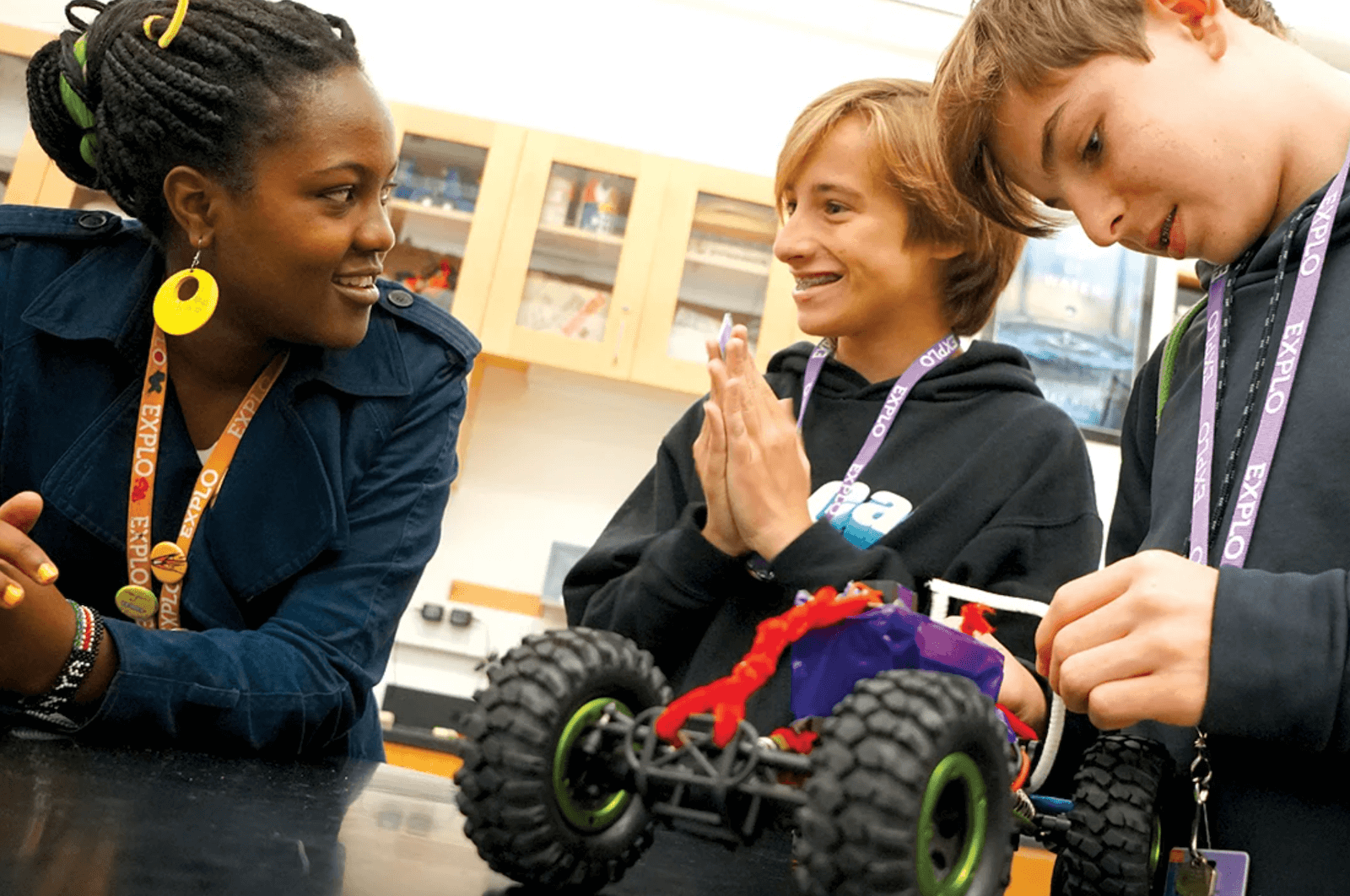
%202.png?width=1100&name=image%20(5)%202.png)
